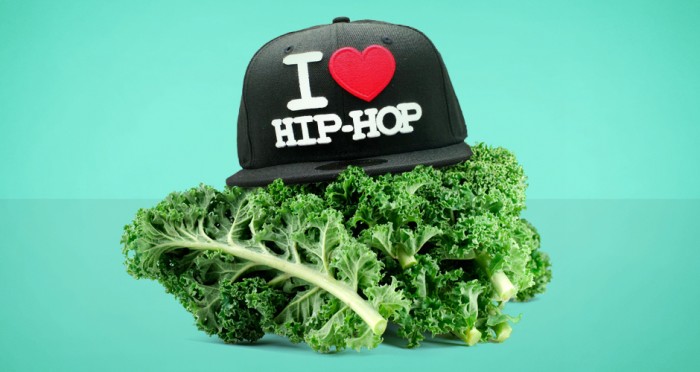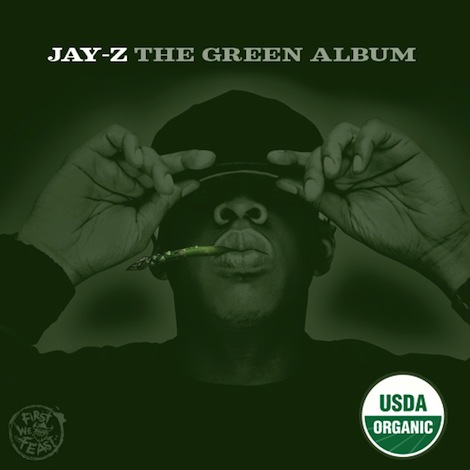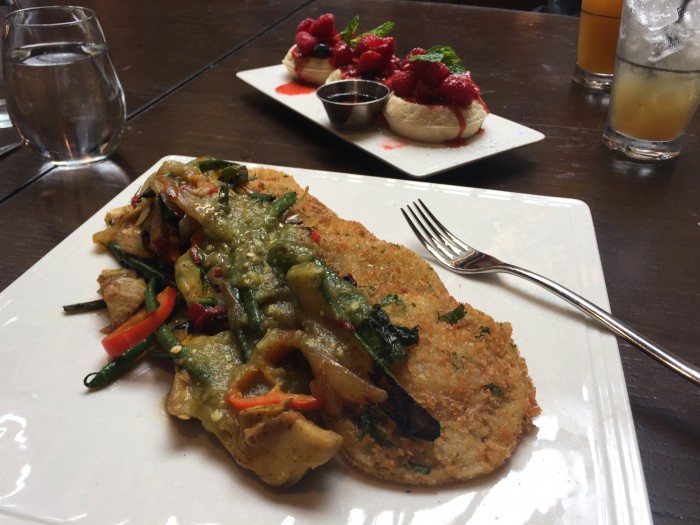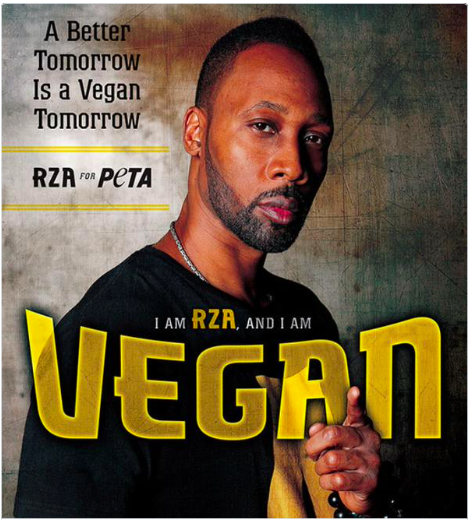
“I’ve been vegan for so long—I used to joke with Jay Z about it all the time,” says Jermaine Dupri, the hip-hop mogul behind the storied So So Def record label. “I’d go to his 40/40 Club and there wasn’t much I could eat, so he’d come over all the time and be like, ‘JD, here you come with that vegan shit!’ Then one day I look up and see him and Beyoncé are being vegan. I told her, ‘You know, he used to make fun of me for that and now he wants to be vegan.’ I had to ride him about that.”
Dupri has been a staunch advocate of avoiding animal products for more than a decade now, but Jay and Bey’s dalliance with the diet began in December of 2013. With Hov’s 44th birthday on the horizon, he decided to take up a 22-day vegan challenge. “I prefer to call it, plant-based!” he blogged enthusiastically.
 Jay Z’s “spiritual and physical cleanse” dominated the headlines, but he’s just one of a number of high-powered hip-hop artists who are trading filet mignon for grilled tofu. André 3000, Common, MCA (before he passed away), and serial rapper’s baby mom Erykah Badu have all embraced veganism to various degrees, while the RZA even became a figurehead for animal rights group PETA, fronting a campaign with the Wu-Tang Clan-referencing slogan, “A better tomorrow is a vegan tomorrow.”
Jay Z’s “spiritual and physical cleanse” dominated the headlines, but he’s just one of a number of high-powered hip-hop artists who are trading filet mignon for grilled tofu. André 3000, Common, MCA (before he passed away), and serial rapper’s baby mom Erykah Badu have all embraced veganism to various degrees, while the RZA even became a figurehead for animal rights group PETA, fronting a campaign with the Wu-Tang Clan-referencing slogan, “A better tomorrow is a vegan tomorrow.”
If the cliché used go that aging rock stars turned hippie and sequestered themselves in small countryside farms, these days hip-hop’s 40-plus set is following a similar (albeit less bucolic) script, foregoing a regimen of excess for one centered around the purities of an animal-free diet.
In light of the music industry’s pitfalls, this emerging trend should come as no surprise. Years spent toggling between stints on the road and late-night studio sessions fueled by a diet of greasy foods, processed snacks, and boatloads of fine spirits take a toll on the body. Stic Man, from the group Dead Prez, describes his transition in grisly terms: “I was surviving on smoke, bourbon, and hot dogs and then I was diagnosed with gout,” he says. His wife, a vegan chef, encouraged him to realign his diet—a move he says has paid dividends and set him on a course of spiritual enlightenment. Now Stic tends to his community garden and lights up his Instagram account with pics of garam masala veggie burgers, coconut kale, and tomato wraps.
Once converted, vegan hip-hop artists are enthusiastic about championing their cause. Stic recalls vegan conversations he had with ?uestlove when the Roots drummer was looking to change his diet. Over the years, he’s also spoken about the machinations of the food industry with Black Moon, Smiff-n-Wessun, Common, and members of the Wu-Tang Clan.

Killah Priest, a long-time affiliate of the Clan, turned vegan a year ago after hearing GZA break down its benefits. “I remember he showed me this YouTube video,” he recalls. “That kind of turned my head about not wanting to eat animals. GZA was talking to me about it and explaining it all.” (Jermaine Dupri cites the documentary Food, Inc. as having a similar impact on his decision to stop consuming animals.)
This idea of hip-hop artists looking to share self-improvement methods has strong roots in the culture. Back in the music’s golden era, rappers like Rakim and Big Daddy Kane aligned themselves with the Nation of Islam spin-off faction, the Five Percent Nation, and laid down a strict “no pork on my fork” agenda. “These were Muslim guys—Five Percenters—and diet is a part of that culture,” said Stic previously. “So listening to hip-hop made me pay attention like, ‘Hey, what’s my diet?’ I was from the South where everything goes with food, so just hearing those things made me more conscious of what I was eating.”
Stretch Armstrong, the vegan DJ who is credited with giving Wu-Tang Clan its first radio spins, says, “Within the hip-hop community there’s always been a thirst for self-knowledge with the leaders like Rakim or KRS-One.Then the Wu-Tang Clan have always encouraged their fans to seek that knowledge out—and I think one of the most powerful things you can learn about is food and food production. Out of any area of life, you have the most control over what you put in your body. You can break the tacit conspiracy between Western medicine, advertising, and unhealthy food by adopting a plant-based diet.”
Hip-hop, of course, always loves a good conspiracy theory.
The broader farm-to-table movement taking hold in the U.S. is also bolstering hip-hop’s embrace of vegan values. Rappers have long proclaimed the virtues of enjoying natural consumables—not least when it comes to traditionally favoring weed over synthetic drugs—and the move towards sustainable and ethically sourced food plays into this ideal. The classic Dead Prez song “Be Healthy” is an ode to clean eating, but even today’s glitzy set seem to be warming to the act as well, with Big Sean freestyling, “My woman is vegan / She got my ass trying different food.”
Stretch Armstrong, the vegan DJ who is credited with giving Wu-Tang Clan its first radio spins, says, “Within the hip-hop community there’s always been a thirst for self-knowledge with the leaders like Rakim or KRS-One.Then the Wu-Tang Clan have always encouraged their fans to seek that knowledge out—and I think one of the most powerful things you can learn about is food and food production. Out of any area of life, you have the most control over what you put in your body. You can break the tacit conspiracy between Western medicine, advertising, and unhealthy food by adopting a plant-based diet.”
Hip-hop, of course, always loves a good conspiracy theory.
The broader farm-to-table movement taking hold in the U.S. is also bolstering hip-hop’s embrace of vegan values. Rappers have long proclaimed the virtues of enjoying natural consumables—not least when it comes to traditionally favoring weed over synthetic drugs—and the move towards sustainable and ethically sourced food plays into this ideal. The classic Dead Prez song “Be Healthy” is an ode to clean eating, but even today’s glitzy set seem to be warming to the act as well, with Big Sean freestyling, “My woman is vegan / She got my ass trying different food.”

Putting a fresh spin on the idea of living a vegan lifestyle, hip-hop artists are fast becoming the poster boys of the movement. RZA’s steely gaze on his PETA poster is far more “protect ya neck” than tree-hugging hippie. The oddball rapper Lil B has launched a vegan emoji app, while Jay Z is reportedly taking his hustler’s smarts to the 22 Days Nutrition company. These moves are all part of a shift away from tired stereotypes that, as Dupri said, have people “thinking we just eat lettuce. They think we’re cool with just eating steamed vegetables, but that’s not what I want on a day-to-day basis.”
To that end, you’ll find JD indulging in a vegan chicken parmigiana with spaghetti at the upscale Craig’s on Melrose Avenue in West Hollywood. That is, until he rolls out his dream of “having a vegan restaurant in every airport in the country.”
True to the genre’s spirit of innovation, the current wave of hip-hop vegans are taking the lifestyle’s traditional tenets and remixing them to fit their own needs. With shades of Rakim proclaiming “fish, which is my favorite dish” on the classic track “Paid In Full,” both Common and NORE recently moved from being vegan to adding fish to their diet. Stretch Armstrong also makes an exception for clams, adding that he won’t feast on anything with a central nervous system. Likewise, Jay Z and Beyoncé aren’t strictly vegan—although they endorse the idea of going plant-based as a cleansing mechanism.
The question now is, what price will it take for Jay Z to convince April Bloomfield to front a new vegan spot?
